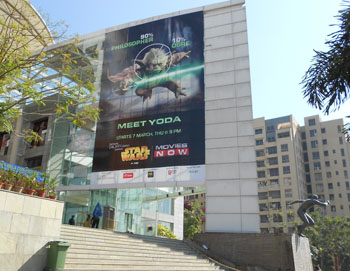Advertising In City Centres

 When it comes to spreading the word about your business, it is essential you target people in the right way in order to attract customers. This is particularly true for those working in big cities, as it is very easy for your message to get lost in a sea of advertising.
When it comes to spreading the word about your business, it is essential you target people in the right way in order to attract customers. This is particularly true for those working in big cities, as it is very easy for your message to get lost in a sea of advertising.
A walk down Canary Wharf in London highlights the opportunity facing savvy organisations, as the area is typically awash with potential customers on their way to and from work. Most of these people will be in a rush, so firms need to come up with a campaign that holds their attention. However, as keen as companies will be to engage potential customers, they need to consider the following factors:
Cost
Small businesses will typically be working to a tight budget and so are always keen to keep costs down. Taking out expensive TV or radio time may not be an option for them, but that’s not to say they can’t advertise at all. Investing between £2 or £3 per unit in quality promotional gifts could generate an excellent return on investment, as your brand, call to action and contact details will be on view every time recipients use their gift.
Picking the right area
Just as with the property market, location is all important when it comes to advertising your brand. If you choose to distribute promotional gifts at a location that does not attract a lot of footfall, the success of the campaign is always going to be limited. This is why organisations should do a bit of research to see what parts of cities have the highest footfall. By finding out this information, they can ensure their team is properly stationed.
Picking the right product
This still leaves one area of discussion though – what promotional products are you going to use in your advertising campaign? There are a number of great options, such as mugs, keyrings and USB sticks. Practicality and usability should be at the heart of your decision making process – on the basis that the longer the recipient retains their gift, the more brand exposure you will generate.
For example, a great idea is to target commuters with travel mugs at peak times. Plenty of workers like to take a coffee or tea with them in their morning commute. And if the travel mugs are printed with your logo, call to action and contact details, chances are that friends, family and fellow commuters will also be exposed to your brand.
When asked by the British Promotional Merchandise Association which promotional product they found to be the most useful, eight per cent said mugs. This placed mugs fourth in the list, behind only USB sticks, electrical items and writing instruments. Some 18 per cent of people also said it’s the gift they hold onto for the longest, putting it ahead of a USB stick (15 per cent) and a pen (12 per cent).
With 33 per cent of consumers indicating they have kept promotional items for between one and two years – and 30 per cent doing so for between three and four years – there is plenty of scope for brands to develop a lasting reminder of their call to action.
